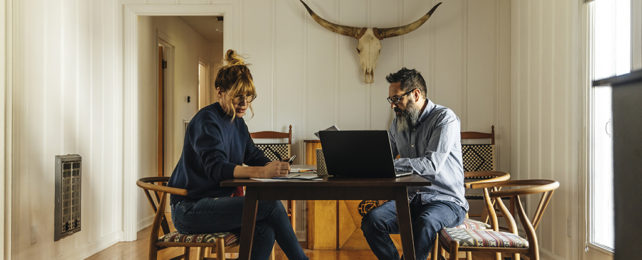The global pandemic has forced entire populations around the world into working from home, often bringing people into close proximity with loved ones and relatives 24/7.
According to a recent study by researchers from the US and China, the experience of mingling domestic needs with career tasks poses very different challenges for the respective halves of heterosexual married couples.
At the center of these differences is housework and family time, including the kinds of chores that can be performed when working from home such as washing or vacuuming, and dedication to responsibilities such as children be it naps or snacks.
The studys results were based on a survey of 223 dual-earner couples from China and South Korea, and included households with and without children.
Participants were asked about the number of non-work tasks they got done while working from home, and how this affected their family commitments.
"We found that men and women don't have the same experience working from home," says Jasmine Hu, a professor of management at Ohio State University.
The statistics revealed that everybody felt they got more done around the house when working from home alone. When dual-income couples were home together, men typically completed fewer household jobs. For women, having their husband home during work hours didn't lighten their domestic load at all.
In both countries surveyed, wives reported feeling increased guilt about failing to get through housework chores and spending more time with their families when asked to do more work at the office. For husbands, this reported guilt was only noticeable in the South Korea data.
The researchers also looked at the flexibility of a home/office routine as sanctioned by an employer. When husbands had flexible work setups, wives got more of their professional work done while working at home; when wives had flexibility at work, husbands completed more tasks around the house when working at home.
"These findings suggest that husbands could help remote working wives when they have more flexible work schedules and do more family tasks when their wives have more rigid work schedules," says Hu.
In addition, both men and women felt more guilt about their work, and a greater sense of conflict between home and work life, because they were getting through more home-related tasks while working from home.
The aim of the study is to improve the experience of working at home for both employees and employers, the researchers say – and to show that flexibility and understanding are important, especially in households where both adult partners are doing their jobs from home rather than in an office.
Partners need to share the household duties, the study authors suggest, while companies should recognize the difficulties that come as the boundaries between work life and home life become increasingly blurred.
" COVID-19 forever changed how we work," says Hu. "Remote working is going to become much more of a norm."
"People have really gotten used to the benefit of working from home and many won't want to go back to the office full time."
The research has been published in Personnel Psychology.
